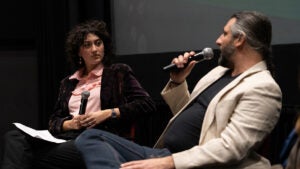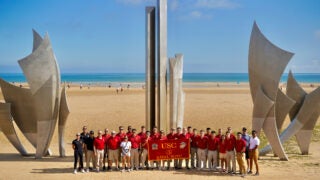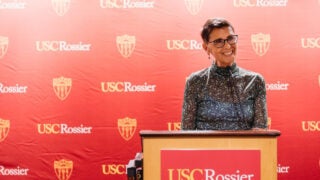
USC students and faculty members work together on the Urban Trees Initiative. (USC Photo/Gus Ruelas)
Eco Film & Media Arts Festival, Urban Trees Initiative receive national sustainability accolades
USC programs are recognized for student engagement and racial equity from the Association for the Advancement of Sustainability in Higher Education.
A student-led film festival and a USC tree research initiative received national recognition from the Association for the Advancement of Sustainability in Higher Education (AASHE), one of the leading organizations promoting sustainability in higher education.

The 2022 Eco Film & Media Arts Festival won the Student Sustainability Leadership Award, while the USC Urban Trees Initiative earned the Racial Equity and Sustainability Collaborations Award as part of the 2023 AASHE Sustainability Awards. The two programs beat out finalists from Yale University, Tufts University, Boston University and others.
USC Chief Sustainability Officer Mick Dalrymple said the recognition for both programs was well-deserved and reflects the continuing importance of sustainability at the university.
“AASHE is the recognized leader for promoting sustainability in higher education, so receiving these awards is a real honor for USC,” Dalrymple said. “The student-led Eco Film & Media Arts Festival is especially gratifying as it shows how deeply engaged our student body is in addressing and identifying solutions to climate change. And of course, the USC Urban Trees Initiative is a wonderful model for how public partnerships can apply research breakthroughs in climate solutions to the people and communities that stand to benefit most.”
The two programs were recognized during the virtual AASHE Sustainability Awards Ceremony on Thursday. The winners receive a plaque from Rivanna Natural Designs, a woman-owned company committed to sustainability.
Using film and media arts to tell urgent, hopeful climate stories
More than 100 people attended the first-ever Eco Film & Media Arts Festival, which featured 11 student-produced short projects at the USC School of Cinematic Arts in November 2022.
Prior to screening the student-made work, the festival’s lead student organizer, Natasha Nutkiewicz, moderated a panel discussion featuring screenwriter and producer Courtnee Zambrano, who worked on Apple TV+’s climate-focused show Extrapolations, and grassroots political organizer Jay Ponti.

Nutkiewicz, who graduated in May with a degree in theater from the USC School of Dramatic Arts and is currently developing various projects in Spain, said she is still working with the panelists from the festival on climate-related ideas. The impact of the festival is still reverberating, she said.
“It’s a great feeling when you do something out of pure love of community and arts, and it is recognized at this level,” Nutkiewicz said. “I’m inspired to keep working and hopefully organize another festival in the new year. As this is going on, we are getting close to surpassing the 2 degree centigrade warming limit, so now is the time to use media to tell hopeful, entertaining, educational and innovative climate stories.”
The Eco Film & Media Arts Festival was supported by the USC Arts & Climate Collective and the School of Cinematic Arts’ division of Media Arts + Practice. The festival was made up of a mixture of short-form documentaries, fictional films and a speculative design project. Each emphasized the festival’s prompt: “We must act now.” A second student-led festival is being planned for March.
Growing an urban tree canopy for vulnerable communities
Launched in 2020, the USC Urban Trees Initiative (USC Trees) is working with the city of Los Angeles to guide the planting of new trees in areas of greatest need. Coordinated by Public Exchange, a program based at the USC Dornsife College of Letters, Arts and Sciences, USC faculty, staff and students are creating science- and community-based tools to support tree planting efforts in L.A. neighborhoods that have less shade, higher pollution exposure and more vulnerable residents including Boyle Heights, City Terrace, El Sereno, Lincoln Heights, Ramona Gardens and University Park. These neighborhoods are predominantly lower-income communities of color that have suffered from historic disinvestment in urban greening.
Monica Dean, climate and sustainability practice director for USC Dornsife Public Exchange, spoke of the importance of centering equity and racial justice in building climate resistance and how the work of USC Trees aims to be an example of this in action.
“We know the climate crisis is having disproportionate impacts on historically marginalized and underserved communities. In Los Angeles, low-income communities of color at the highest risk of heat exposure also live in the most tree-poor areas of the city,” Dean said. “We created the USC Urban Trees Initiative to support city officials, urban foresters, community members and other practitioners by equipping them with the data and tools they need to prioritize tree plantings in the most equitable and sustainable manner. We know it’s not just how many trees are planted, but where they are planted that matters.”



